Filter by

Youthquake 2017 : the rise of young cosmopolitans in Britain
This book investigates the reasons behind the 2017 youthquake – which saw the highest rate of youth turnout in a quarter of a century, and an unprecedented gap in youth support for Labour over the Conservative Party – from both a comparative and a theoretical perspective. It compares youth turnout and party allegiance over time and traces changes in youth political participation in the UK s…
- Edition
- -
- ISBN/ISSN
- 9783319974699
- Collation
- xiii, 129p. : ill.
- Series Title
- -
- Call Number
- 323.04208350941 SLO y
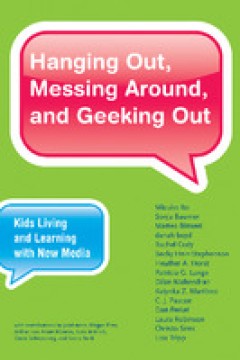
Hanging Out, Messing Around, and Geeking Out : Kids Living and Learning with …
An examination of young people's everyday new media practices—including video-game playing, text-messaging, digital media production, and social media use.Conventional wisdom about young people's use of digital technology often equates generational identity with technology identity: today's teens seem constantly plugged in to video games, social networking sites, and text messaging. Yet there…
- Edition
- -
- ISBN/ISSN
- 9780262518543
- Collation
- XIX, 419 p.
- Series Title
- -
- Call Number
- 302.23083 ITO h
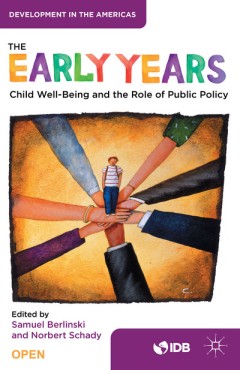
The Early years: child well-being and the role of publlic policy
This book is open access under a CC BY-NC-ND 3.0 IGO license. The Early Years analyzes the development of Latin American and Caribbean children and makes a compelling case for government intervention in what is instinctively a family affair. Spending on effective programs for young children is an investment that, if done well, will have very high returns, while failure to implement such program…
- Edition
- -
- ISBN/ISSN
- 9781137536495
- Collation
- xxii, 262p.: ill.
- Series Title
- -
- Call Number
- 362.7 EAR e
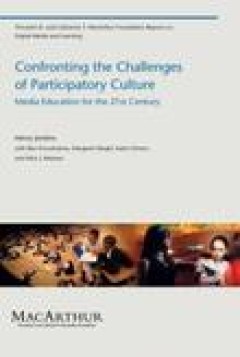
Confronting the challenge of participatory culture: media education for the 2…
Many teens today who use the Internet are actively involved in participatory cultures—joining online communities (Facebook, message boards, game clans), producing creative work in new forms (digital sampling, modding, fan videomaking, fan fiction), working in teams to complete tasks and develop new knowledge (as in Wikipedia), and shaping the flow of media (as in blogging or podcasting). A gr…
- Edition
- -
- ISBN/ISSN
- 9780262513623
- Collation
- xv, 129p.
- Series Title
- -
- Call Number
- 302.23 JEN c
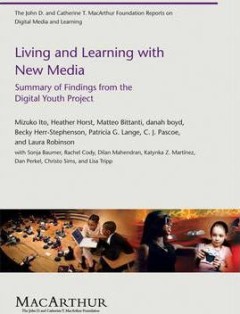
Living and learning with new media : summary of findings from the digital you…
This report summarizes the results of an ambitious three-year ethnographic study, funded by the John D. and Catherine T. MacArthur Foundation, into how young people are living and learning with new media in varied settings—at home, in after school programs, and in online spaces. It offers a condensed version of a longer treatment provided in the book Hanging Out, Messing Around, and Geeking O…
- Edition
- -
- ISBN/ISSN
- 9780262513654
- Collation
- xx, 98p. : ill.
- Series Title
- -
- Call Number
- 302.23108350973 MIZ l
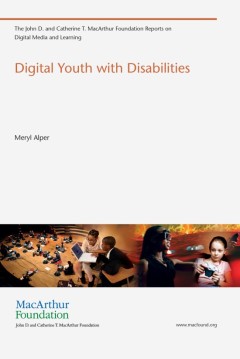
Digital youth with disabilities
An examination of media and technology use by school-aged youth with disabilities, with an emphasis on media use at home.Most research on media use by young people with disabilities focuses on the therapeutic and rehabilitative uses of technology; less attention has been paid to their day-to-day encounters with media and technology—the mundane, sometimes pleasurable and sometimes frustrating …
- Edition
- -
- ISBN/ISSN
- 9780262527156
- Collation
- ix, 106p. : ill.
- Series Title
- -
- Call Number
- 305.908083 ALP d
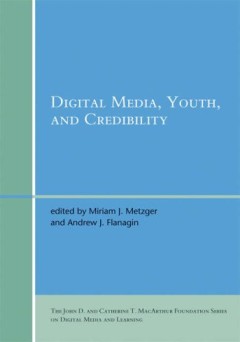
Digital media, youth, and credibility
The difficulties in determining the quality of information on the Internet—in particular, the implications of wide access and questionable credibility for youth and learning.Today we have access to an almost inconceivably vast amount of information, from sources that are increasingly portable, accessible, and interactive. The Internet and the explosion of digital media content have made more …
- Edition
- -
- ISBN/ISSN
- 9780262562324
- Collation
- 212p. : ill.
- Series Title
- -
- Call Number
- 302.2310835 DIG d
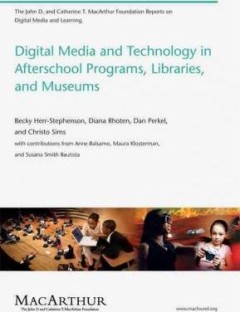
Digital media and technology in afterschool programs, libraries, and museums
An investigation of how three kinds of youth organizations have integrated digital practices into their programs.Digital media and technology have become culturally and economically powerful parts of contemporary middle-class American childhoods. Immersed in various forms of digital media as well as mobile and Web-based technologies, young people today appear to develop knowledge and skills thr…
- Edition
- -
- ISBN/ISSN
- 9780262515764
- Collation
- x, 80p. : ill.
- Series Title
- -
- Call Number
- 370.152 HER d
 Computer Science, Information & General Works
Computer Science, Information & General Works  Philosophy & Psychology
Philosophy & Psychology  Religion
Religion  Social Sciences
Social Sciences  Language
Language  Pure Science
Pure Science  Applied Sciences
Applied Sciences  Art & Recreation
Art & Recreation  Literature
Literature  History & Geography
History & Geography